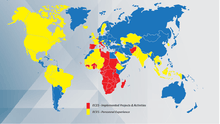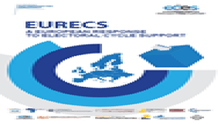European Centre for Electoral Support (ECES)
 | |
| Formation | 2010 |
|---|---|
| Headquarters | 209A Avenue Louise, Brussels Belgium |
| Monica Fassoni, Fabio Bargiacchi, Eva Palmans, Andebrhan Giorgis, Lino Francescon, Paulo Marques | |
Key people |
Monica Frassoni, President Fabio Bargiacchi, Director |
| Website | www.eces.eu |
The European Centre for Electoral Support (ECES) is a non-profit private foundation, headquartered in Brussels (Belgium) and created in 2010.
ECES aims to promote sustainable democratic development through advisory services and operational support to electoral stakeholders, such as electoral management bodies, civil society organizations (active in the field of civic & voter education and election observation), political parties, parliaments, media, security forces and electoral dispute resolutions bodies.
Since its creation, ECES has implemented activities in around 35 countries mostly funded by the EU and EU member states and predominantly in Africa and the Middle East.
ECES’ President is Monica Frassoni, a former EU Member of Parliament, presently the Co-Chair of the European Green Party and twice Chief Observer for the EU Election Observation Missions (Venezuela and Bolivia, both in 2006) appointed by the former EU Commissioner for External Relations, Ferrero-Waldner.
ECES holds the vice-presidency of the European Partnership for Democracy (EPD), an important European network working on democracy assistance which is composed of 13 European not for profit organisations from 12 EU Member States. ECES and EPD are implementing projects following a joint strategy entitled “European Response to Electoral Cycle Support-EURECS” in line with the EU Action Plan on Human Rights and Democracy 2015-2019, and the call of the EU to “strengthen long-term planning and integrated deployment of all aspects of EU and Member State support to the electoral cycle,[1] by exploring innovative aid delivery mechanisms”.
History
The European Centre for Electoral Support (ECES) was launched in December 2010 during the European Development Days forum at the Panel on Democracy and Human Rights organized by the European Commission. Since then ECES implemented electoral assistance activities in a large number of different African and Middle Eastern countries

Mission
ECES’ work focuses on:
- Electoral and democracy support,
- creating synergies between election observation and electoral assistance programmes,
- capacity building, cooperation, peer reviews and exchange of experiences in a South-South perspective,
- support of knowledge development in electoral administration,
- developing leadership and conflict management skills for different electoral stakeholders through trainings and advisory services.
ECES is also a member of the European Partnership for Democracy and, within the framework of this network, ECES and EPD developed the European Response for Electoral Cycle Support, a strategy for the implementation of the EU’s democracy and electoral assistance by European non-profits organisations. Combined, the members of EPD implemented over 200 projects in around 130 countries in the last five years.
The strategy was presented, in June 2016, at the European Development Days[2] (EDD 2016). ECES participated with the European Partnership for Democracy and they released the lessons learned from supporting democratic and electoral processes over the previous five years. ECES also participated inthe high-level panel “Implementing Sustainable Development Goal 16 for peaceful and inclusive societies - Opportunities and challenges in the security and development nexus[3]”, chaired by the High Representative of the Union for Foreign Affairs & Security Policy/Vice-President of the European Commission (HRVP), Federica Mogherini. The panel was also composed of: the newly elected presidents of the Central African Republic (CAR), Faustin-Archange Touadéra, and Burkina Faso, Roch Marc Christian Kaboré and youth activist Marouane Bakin, founders of «Makers of Hope for Human Rights». ECES was represented by Thijs Berman, former member of the European Parliament and head of ECES’ EU funded project in the Central African Republic.

Key activities
ECES, following the EURECS approach, implements a range of activities for electoral stakeholders.
- Electoral Political Economy Analyses (EPEA)
- Prevent, Mitigate and Manage Electoral Related Conflicts.
- Election Situation Room and Conflict Mapping.
- Political Party Support.
- Parliamentary Support.
- Media Monitoring and Institutional Communication.
- Civic and Voter Education.
- Sensitization Campaigns.
- Capacity building for local Authorities for Credible and Sustainable Electoral Processes.
- Integrity and Quality Management Systems in Electoral Process in accordance with the Technical Specification of International Standardization organization (ISO) 17582:2014 for Electoral Management Bodies.
- Procurement of Electoral Material.
- Ballot paper Design and Transmission of Results.
- Capacity development through training programs.[4]
- Leadership and Conflict Management Skills for Electoral Stakeholders - LEAD Training, in collaboration with the Centre for Creative Leadership and delivered in English, French, Portuguese, Spanish and Arabic.[5]
- BRIDGE trainings[6] (Building Resources in Democracy, Governance, and Elections).
- Effective Electoral Assistance Training.
Main Recent Projects
Le Projet d'Appui à la Crédibilité et à la Transparence des Elections au Burkina-Faso (PACTE-BF)
The multi-donor project in Support of the Credibility and the Transparency of Elections in Burkina Faso (PACTE BF) was conceived to provide technical and operational support to the National Electoral Management Body (INEC). The project, implemented by ECES in partnership with Osservatorio di Pavia,[7] was designed to support INEC in the implementation of its mission and, more precisely, in the organisation of presidential and legislative (2015) elections and municipal (2016) elections.
Le Projet d'Appui à la Crédibilité et à la Transparence des Elections en Guinée (PACTE-GUINEE)
ECES began its activities in Guinea on 2014 with a project in support of the strengthening of the Capacities of the National Assembly (PARCAN I). Since then, ECES remains very active in supporting electoral processes in Guinea and implemented, in addition of an extension of the project in support of the National Assembly (PARCAN II) in 2015, two projects in support of the Credibility and the Transparency of Elections in Guinea Conakry (PACTE GUINNE I and II) in 2015 and 2016. These projects, funded by the EU, aim at strengthening the capacities of electoral stakeholders by supporting newly installed democratic institutions, media, civil society and through contributing to reduce potential conflicts by strengthening electoral disputes management.
Le Projet d'Appui à la Crédibilité et à la Transparence des Elections au Madagascar (PACTE-MADAGASCAR)
In 2013-2014, the Project in Support of the Credibility and the Transparency of the Electoral Process in Madagascar funded by the EU, was designed to foster a more professional, impartial and systematic management of the Madagascar electoral process, through the strengthening of the capacity of local electoral stakeholders, such as civil society organizations, media, political parties, electoral candidates, lawyers and the CENIT (Independent National Electoral Commission for the Transition).
Le Projet d'Appui à la Crédibilité et à la Transparence des Elections au Comores (PACTE-COMORES)
Within the framework of EU support to democratic processes, ECES implemented its first EU-funded project in Comoros on 2014 with a project that aimed at contributing to the organization of credible and transparent elections for legislative elections and elections for island counsellors (2015) while strengthening the capacities of the electoral stakeholders[8] (PACTE Comoros I). Based on this first successful collaboration in the assistance to the Comorian electoral administration and other electoral stakeholders, a new project supporting the organization of presidential and governors’ elections started in 2016 and is still ongoing, aiming to follow up on the endeavors of PACTE-Comoros I, while capitalizing on the recommendations of election observation missions (2015), as well as on the conclusions of its external evaluation.
Preventing Electoral Violence in the SADC Region (PEV-SADC).
The overall objective of the project “Preventing Electoral Violence in the SADC - PEVSADC” is to support key players, like civil society organisations across the SADC (through SADC-Electoral Support Network), in preventing electoral related violence and conflict. PEV-SADC started in 2013 and has 2 components, a comprehensive capacity development scheme for civil society, electoral management bodies and other stakeholders in the electoral process, and a research component that is meant to harvest first hand data on election related violence and conflict that in turn will be fed into an observatory.
Funding
The European Union and its Member States are the largest donors of ECES by far however ECES has been funded and collaborated with more than 20 donors.
Notes
- ↑ "Electoral Cycle —". aceproject.org. Retrieved 2016-11-10.
- ↑ "European Development Days". European Development Days. Retrieved 2016-11-10.
- ↑ lab360 (2016-04-14). "Implementing Sustainable Development Goal 16 for peaceful and inclusive societies". European Development Days. Retrieved 2016-11-10.
- ↑ "Where to get trained as an Electoral Observer". Election observation. 2015-01-15. Retrieved 2016-11-10.
- ↑ "CCL Collaborates with the European Center for Electoral Support | Leadership Explorer Tools". www.leadingeffectively.com. Retrieved 2016-11-10.
- ↑ Pública, Consell de Diplomàcia. "DIPLOCAT - Election Observation Training". www.diplocat.cat. Retrieved 2016-11-10.
- ↑ "From Brussels to Burkina Faso. Objective: participation". ICS - International Communication Summit. Retrieved 2016-11-10.
- ↑ Comores, Aimons les. "Crédibilité et Transparence des élections de 2016 en Union des Comores – l'Union européenne a octroyé un montant de 4.100.000 euros - Le blog Aimons les Comores de SAID IBRAHIM". Le blog Aimons les Comores de SAID IBRAHIM (in French). Retrieved 2016-11-10.
References
https://eudevdays.eu/sessions/european-response-electoral-cycle-support
http://www.aceeeo.org/hu/node/191
http://www.diplocat.cat/en/activities/training/election-observation-training
https://sites.google.com/site/electoralintegrityproject4/links2
http://wagner-hatfield.com/index.php/2015/12/12/strengthening-the-electoral-process-in-the-comoros/
http://www.themediateur.eu/news/item/314-barcelona_training
http://www.ispionline.it/it/ispi-school/course-typologies/advanced-diploma/ad-electoral-assistance
https://www.electoralnetwork.org/index.php/user/members
http://phys.org/news/2014-06-satellites-rural-africa.html
http://www.collateralcreations.com/Video-soutien-a-la-democratisation?lang=en
http://www.fasozine.com/elections-des-partenaires-europeens-offrent-du-materiel-a-la-ceni/
http://cesko.ge/eng/static/408/mexute-yovelwliuri-shexvedra-2015